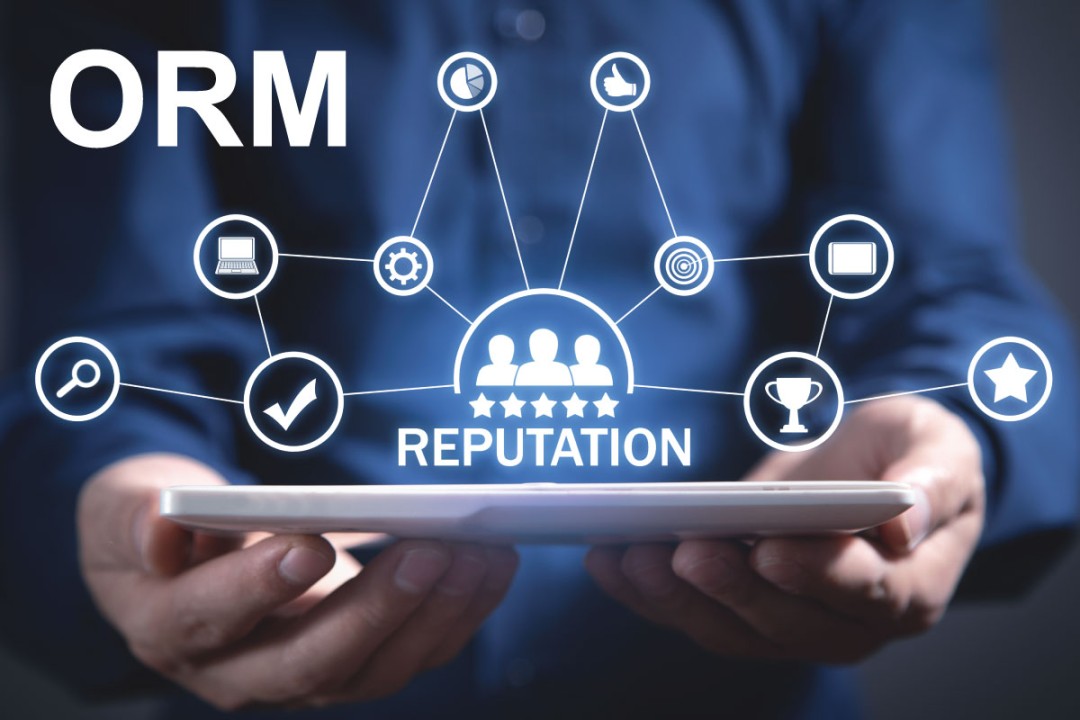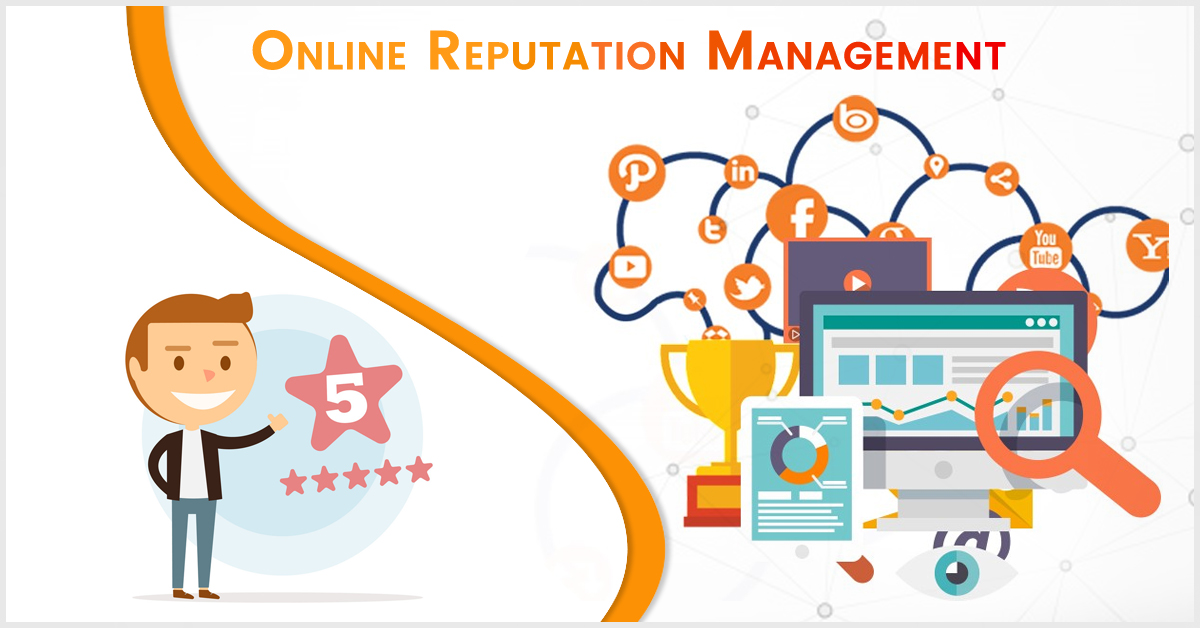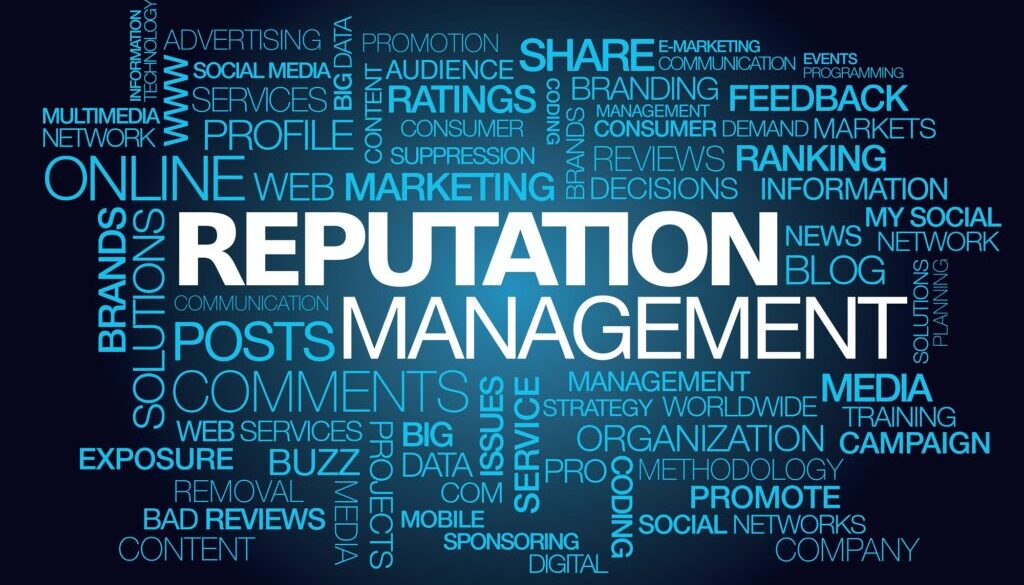
Advertising and marketing have changed a lot because of digital media. It's now easier for businesses of all kinds to reach and interact with their target customers. However, online brand image management is more critical than ever because of constant hacking risks and the ease with which people can share unedited information on social media and search engines.
As social media and other online platforms have grown in popularity, it has become more critical for people and companies to keep up with their online image. Harmful material or comments can have a significant effect on your image and your ability to make money.
Online Reputation Managementincludes many methods, such as search engine optimization (SEO), content marketing, social media management, and disaster management.
The main goal of Online Reputation Management is to boost positive reviews and content on search results and social media sites while lowering or getting rid of bad content. In this article, we will discuss online reputation management for brands or businesses.
Online reputation management is the process of keeping an eye on and changing how people feel about your businesson the internet in order to counteract wrong opinions and boost positive ones. It usually means reacting to bad reviews, hiding negative search results, and clearing up false information about your business.
The main goal of ORM is to protect your image, which is similar to digital public relations (PR), rather than actively making your brand look good. Digital reputation management, internet reputation management, and online reputation management are some other names for the same thing.
To ensure the protection of your website, it is essential to comprehend potential threats and acquire knowledge on how to thwart them. Below, find 16 straightforward tips to shield your brand Online;
Enable Email Alerts In Google Webmaster Tools
Initiating email alerts through Google Webmaster Tools is a prudent step. Google can notify you via email if your website encounters issues such as:
- Malware attacks
- Pages not being indexed
- Server problems
- Penalties from Google
To start, connect your website to Google Webmaster Tools and log in. Then, click on "Webmaster Tools Preferences."
Monitor Your Backlink Profile
Vigilantly tracking your backlinks is pivotal in preventing spammers from attempting negative SEO through the creation of low-quality links or redirects. Utilize tools like Ahrefs or Open Site Explorer, or consider using MonitorBacklinks.com.
Strengthen The Security Of Your Valuable Backlinks
Spammers may try to remove your premium backlinks by posing as you when contacting webmasters. Take the following steps to mitigate this risk:
- Use an email address from your domain when reaching out to webmasters.
- Monitor your best backlinks with tools like Monitor Backlinks.
- Sort your backlinks by Page Rank or social activity to protect valuable links.
Safeguard Your Website From Malware And Unauthorized Access
- Securing your website is vital to prevent spam and unauthorized access. Implement the following measures:
- For WordPress users, install the Google Authenticator Plugin and set up a 2-step verification password.
- Create a robust password containing numbers and special characters.
- Regularly back up files and databases to ensure data safety.
- Consult your hosting company on installing antivirus for user-uploaded files.
Identify And Address Duplicate Content
Combat the spread of copied content across the web, which can negatively impact your site's rankings. Use Copyscape.com to verify the uniqueness of your content.
Monitor Your Brand's Mentions On Social Media
Stay on top of brand mentions using tools like Mention.net. Set up alerts by creating an account, naming your alert, adding keywords to track, and selecting languages to monitor. This aids in maintaining a credible online presence.
Optimize Your Website's Loading Speed
Check for sudden spikes in loading time, as it may be due to an overwhelming number of server requests. Use Pingdom.com to monitor server uptime and loading time, activating email alerts to stay informed during downtime.
Avoid Becoming A Target Of Your SEO Tactics
Prevent negative consequences by eliminating harmful SEO practices:
- Refrain from linking to penalized websites.
- Avoid purchasing links from blog networks.
- Do not flood your site with low-quality guest posts.
- Be cautious about excessive backlinking with "money keywords."
- If selling links, use the "nofollow" attribute to maintain a strong SEO strategy.
Foster Positive Relationships In The Online Sphere
Engage positively online to reduce the risk of conflicts with clients and adversaries. Understand the motivations behind spamming and take steps to maintain a healthy online presence.
Regularly Audit Your Links
Conduct regular link reviews to detect and address unusual activity before it escalates into a significant problem.
Identify Instances Of Content Plagiarism
Combat content plagiarism by identifying instances of scraping, where your content is copied and posted elsewhere without consent.
Monitor Your Google My Business Listing
Keep a close watch on your Google My Business listing to manage online reviews and prevent potential harm to your reputation.
Analyze The Click-Through Rates Of Your Keywords
Monitor keyword click-through rates to detect anomalies and address them promptly, maintaining a healthy user experience and SEO performance.
Enhance Your Website's Security Measures
Keep your software up-to-date, apply security patches regularly, and consider migrating to HTTPS for enhanced security, especially for e-commerce sites.
Employ Only Up-to-Date, Proven, And Secure SEO Strategies
Focus on consistent, trustworthy SEO practices to build authority over time and gradually improve your website's rankings.
Avoid Unnecessary Online Conflicts
Steer clear of unnecessary online disputes, as engaging in controversial discussions may lead to unforeseen consequences.
Why Your Business Needs Online Reputation Management?
Managing your brand's image is essential for success in the digital world. People go to the internet first when they want to learn more about a person, business, product, or service, and reading online reviews is a big part of their study.
Appeal To High-Intent Prospects
Customers are always looking at what they can do. About 97 percent of customers say that reviews of businesses affect their choices to buy. In the same way, 95% of tourists read reviews online before they book a place to stay. Monitoring reviews and managing your image are both parts of internet reputation management.
These skills will help you get your good business reviews seen by more people on the internet.
A study found that ORM helped businesses increase their sales by an average of 15% and reduce their customer churn rate by an average of 10%. (Source: Reputationx)
Generate Positive Business Reviews
Statistics show that 92% of people who use the internet don't trust a brand that doesn't have reviews on the internet. Additionally, 23% said it's easier for them to decide what to buy when there are no reviews available. A reputation manager makes sure that your business always has new, verified internet reviews for customers to use as they decide what to buy.
A reputation management company will also use advanced reputation management tools to help you come up with a plan for getting reviews and honest reviews from happy customers online.
Increase Your Customer Lifetime Value (Clv) And Loyalty
It's 6-7 times cheaper to sell to people you already have than to find new ones. However, one of the hardest things for businesses these days is keeping long-term customers happy.
Company image management is a one-of-a-kind way to make your company more open and earn your customers' trust. Reputation management firms use both good and bad online reviews to show that you care about your customers and build better relationships with them.
Attract High-Performing Employees
The people on your team are critical to the success of your business. So, it would be best if you made sure that the happiness of your employees is one of your main goals. Internet image management lets you track how engaged and happy your employees are, as well as get helpful information that you can use to make your plans for hiring and keeping employees better.
At least 69% of job applicants would turn down a job offer from a company that has a lousy image online. You should hire a reputation management service that focuses on your overall growth if you want to get the right people to work for you and grow your team.
Improve Your Bottom Line
You need web reputation management to protect your brand image and get new customers, whether you run an online shop, a business with multiple locations, or a traditional storefront.
A study by the Spiegel Research Centerfound that online reviews boost sales by 270%. Also, business reviews can increase the number of people who buy expensive goods by as much as 380 percent. With search engine reputation management, you can get to know your prospects better and use all the different ways you can talk to them to turn them into paid customers.
Boost Your Seo Efforts
SEO image management is a great way to get people to know about your brand, give customers a chance to say what they think online, and improve your search ranks. Moz says that web reviews make up 15% of the factors that Google uses to rank local businesses. You can get more user-generated content (UGC) on your landing pages by learning how to get more reviews on Google and other review sites.
This brings approved traffic and leads to your sales pages. Most of the time, the best reputation management companies add user-generated content (UGC) to your Google My Business (GMB) page and other marketing efforts. This shows that people can trust your business and raises your Google ranks and click-through rates (CTRs).
How Is Online Reputation Management Different From SEO?
Online reputation management is a way to keep an eye on and fix the picture of a brand. One question that comes up is how to tell the difference between SEO and ORM.
SEO is the process of making changes to a website so that it shows up higher on Google, Bing, and other search engines. SEO comes up with plans to help websites get to the top of search results. The goal of SEO is to be at the top of the search results for a lot of related keywords or search terms.
Search engine optimization (SEO) is the process of adding good information to a page so that people will accept it. ORM and SEO work together to move or get rid of websites and content that aren't trustworthy in search results. The goal of ORM is to be at the top of the search results for specific related keywords or search terms.
8 Online Reputation Management Techniques For Brands
Perform A Brand Audit
An essential first step in managing your online image is to do a brand audit. Check out everything that's online about you, like your website, blog, social media accounts, and business pages on other sites.
Also, look closely at the findings of your Google search. What do people find when they look for your brand name and things that are connected to it? Are there any results that need to be added to the brand?
Are there too many news stories that need more company assets that can be managed? Remember that good stories are great until something terrible happens. Then, overnight, those stories will change to being wrong.
Monitor Brand Mentions
Monitoring where your business is talked about online is an excellent way to keep it under control. Set up alerts for your brand name and related terms, and then act quickly whenever they are mentioned, whether it's a good thing or a bad thing.
This includes things like blog posts, groups, movies, and social media posts that talk about your business. It's best to find and stop bad references as soon as possible. It's easy for most people to accept companies that do something wrong as long as they try to fix it.
Respond To Negative Reviews
You might ignore bad reviews online and hope they go away, but that's not a good idea. When people leave bad reviews, your brand has the chance to deal with the issues directly, show that it cares about customers, and connect more naturally with people who might buy from you.
Always respond to reviews, whether they are good or bad. Even if the input is terrible, thank the customer for giving it. And always offer natural ways to fix issues. Customers don't want a 20% off offer for their next buy if they have a terrible experience.
If you do things that way, you won't make another buy. Show people that you care about your business by going the extra mile. Then they will know they can trust you to make things right.
Invest In SEO
SEO is an integral part of managing your online image, but the approach is a little different. Most of the time, SEO is used to rank different pages on the same website for different types of search queries. In ORM, on the other hand, we use SEO to rank a bunch of different websites for a few brand-focused searches.
After that, you'll be able to hide lousy search results and show good material that you control instead. As many web pages as you can control should be optimized for brand-related keywords as part of your branded SEO plan.
When you use SEO to handle your image, keep in mind that Google usually gives more weight to reliable sources. As a result, you should work on making your website more authoritative and trustworthy, as well as making the most of your profile on authoritative third-party sites.
Use Social Media Effectively
Using social media to sell your business is more than just putting pictures of your goods or services. It's also about staying involved on social networks and making material that people want to read in order to connect with customers and future customers. These days, there are so many sites that it takes little work to figure out which ones work best for your business.
That being said, a great way to start managing your online image is to use social media. Social media lets you interact with customers, build a good reputation for your brand, get the word out about your product listings, and do a lot more.
You can also use social media to control your online image in a number of ways, such as by reacting to nasty comments and giving more information about your goods. One of the best things about social media is that it can help you build connections with your viewers that last.
Protect Your Customers’ Data
Without a doubt, each company must have a firm plan for keeping information safe. To do this, you must keep private customer data like names, phone numbers, addresses, emails, and other data safe from hackers and identity thieves.
It is essential to keep data safe, especially when it comes to customer data. Using strong passwords, keeping an eye on network logs, and installing antivirus software are all good ways to keep your info safe.
Update Your Business Listings Regularly
When did you last make changes to your local business listing? Are you sure you know what your business says now? These days, people are always looking for places to buy things, and companies are expected always to have complete and correct lists ready. Keep your company from getting lost.
Make sure that your website and social media pages always have the most up-to-date contact information. Since you're always looking for new business, why not give possible customers the best chance to get in touch with you by keeping your information up to date?
Plan Your Crisis Management Strategy
Problems appear out of the blue. What's good? You can get ready for them by making a plan for how to handle a problem. Your approach should include a plan for how to communicate with people inside the company, who on the team will handle replies from the public, and how to handle statements on social media.
Watch out for changes in your field. Depending on the business you're in, changes in the law, culture, or technology could be complex for your company. Find out which outlets your audience likes best and how to talk to them most effectively. If most of your audience is on Facebook, then that should be where you communicate with them most often.
In this way, you can reach more people more quickly. Planning will help you respond quickly to nasty comments. Make sure that no one copies and pastes the same answer without changing it. At the wrong time, this might seem uncaring.
FAQs About Online Reputation Management
Why Is ORM Important For Businesses?
ORM is crucial because people often turn to the internet to form opinions about products, services, and businesses. A positive online reputation can attract customers, while a negative one can deter them.
How Does ORM Impact Customer Trust?
ORM builds customer trust by actively addressing negative reviews, showcasing positive experiences, demonstrating a commitment to customer satisfaction, and fostering a positive brand image.
Can ORM Improve Search Engine Rankings?
Yes, ORM and SEO are interconnected. Positive online content, reviews, and social media engagement contribute to improved search rankings, pushing negative results down in search engine results.
How Does ORM Attract High-Performing Employees?
A positive online reputation signals a healthy and trustworthy work environment. Potential employees are more likely to be attracted to companies with a positive online image.
A Quick Recap About Online Reputation Management
A plan for managing your online reputation is an essential part of running a small business. If you want to build or keep a good brand image, you'll be ready to win in today's market. To make sure that your small business can grow and reach its full potential, you should have a well-rounded plan for managing its online image.
Online Reputation Management (ORM) is essential for companies in today's constantly changing digital world, where people are sharing information all the time and there are hacking risks. As a consumer's online appearance has a significant impact on their choices, strategic ORM is necessary to build a good company image.






